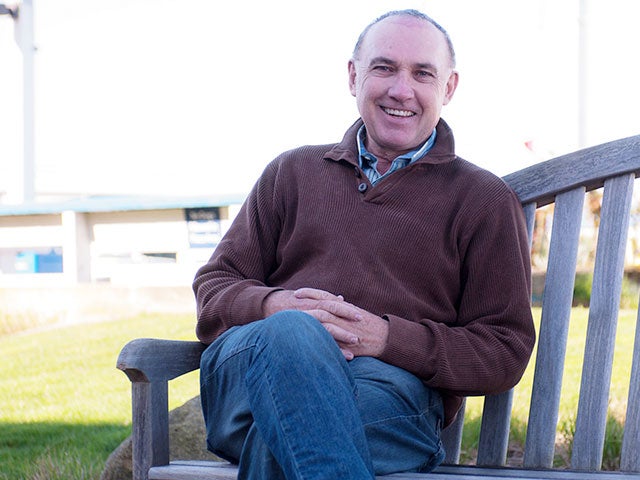When It's Time to Hang in There

Many people call, in utter exhaustion and ask, “When is it time to give up?”
While I appreciate the weariness behind this question, I’m a Solution-Focused, Christian Psychologist and see hope in almost every situation. It’s not blind hope, the magical thinking kind. It’s the kind that sees opportunities for change.
I received a call recently that reminded me of this kind of hope—the “hang in there, it’s not all over” kind of hope.
"I’m so tired of holding our marriage together,” Trish said. She made her intentions clear. Her voice was tired and thin.
“I don’t hold out much hope,” she continued. “I’m mostly calling because Jess wanted me to. He found your program and wants to come out to save our marriage. But, I don’t think I’m really interested.”
“Tell me more about what’s going on,” I pressed.
“Twenty years of feeling like I’m just an appendage to him,” she complained. “He’s controlling, angry, even conniving,” Trish said. “I can’t honestly tell you that I like him anymore.”
“How many years have you been married?” I asked.
“Twenty!” she said. “He says they’ve been mostly good, but he doesn’t get it that I’ve been coasting for the last ten, and I can’t coast anymore.”
I couldn’t help but reflect on the hundreds of calls I receive like Trish's. There are so many women who hang in there, hold the family and marriage together, only to eventually run out of steam. They fight and struggle, read the books, drag their men to the marriage conferences, only to eventually drop from carrying so much in their packs.
“Will he talk to me?” I asked.
“Oh, he’ll talk to you,” she said. “Now that I’ve told him I’m leaving. He’ll even come for one of your Personal Intensives. He is ready to look at what makes him tick. But, I’ve got to be really honest with you. It might be too late.”
“Understood,” I said. “Let’s get him to The Marriage Recovery Center and take an emotional X-ray. Desperation is a good place for men to be. We’ll find out why and where he’s been burying his pain. We’ll examine why he cannot make a healthy connection to you.”
“Sounds like a start,” Trish said, still sounding fatigued.
“Would you be willing to join him after he does some depth work?” I asked.
"Not now," she said. “If he comes, and that has yet to be seen, and he shows me that I’m more important than his work, sports and alcohol, then we’ll see. I want him to be healthy."
"Can’t ask for more than that, Trish," I said.
"We’ll see if he calls," she said. "If he does, and if he comes and works with you, then we'll see."
We talked for another half an hour. Her story was painfully familiar. Over their 20 years of marriage, there had been good times and bad. Incidents of infidelity had marred their marriage, episodes of alcohol by both had added turmoil, and yet they had held their marriage together by sheer tenacity. The prospect of their youngest daughter leaving home had pushed Trish to the edge.
Jess did call. He was edgy, irritated at his life circumstances, and not entirely happy about coming for a Personal Intensive. In a phone call with me, he complained about the travel, the price and of course, that the problem wasn’t all him. I reassured him that indeed the problem was not all him, but that he had to “clean up his side of the street” to get a better sense about what was happening in their marriage.
Several weeks later, I met Jess and began our work. Here, in short, is how we spent the next two and a half days:
1. We set the stage for our work.
Jess was used to being 'large and in charge'. This would no longer work for him, and he had to give up some of the control of his life to his wife, myself and God. He had to assume that what he was doing would no longer work for him. He had to develop an attitude of being honest, open and willing. In short, he had to be broken.
The Psalmist speaks highly of this: "The sacrifices of God are a broken spirit, a broken and contrite heart—these, oh God, you will not despise." (Psalm 51:17)
2. He had to trust that there was a better way.
For as much as he had become a self-made man, this attitude had worked in business but not in marriage. He had to believe that there were answers outside of him. Attitudes of grandiosity don’t work in relationships, which require give and take, reciprocity and mutuality.
3. He had to understand how his personality had developed.
Many men have had profound rejection and 'father hunger', leaving them painfully alone and fending for themselves. They don’t ask for help and rarely reach out to truly accept it. Isolated and lonely, they develop a critical and controlling attitude. Unable to share their pain, they speak from a voice of power, control and defensiveness.
4. He had to develop his softer, more vulnerable side.
Trish knew there was "a good man in there somewhere", and we had to find him and give him a voice. What was the pain that Jess buried beneath his perfectionistic quest for power and prestige? We needed to create a Healing Container where he felt safe to share his fears of failure. We needed to help him voice his desire for connection and appreciation he wanted from Karla.
5. He needed to set out on a new quest.
This new quest needed to be to win back the heart of his wife. Having proved himself in business and work, it was time to renew an old quest: the heart of his wife. Though she might be leaving him, there was a glimmer of hope that if he could find his soft voice, speak from a place of vulnerability, she would want contact with him again. Hidden beneath years of sadness was a woman who truly believed in her man.
Is there still a glimmer of hope in your marriage, especially if you bring about an Intervention that is "a breakdown that leads to a breakthrough"? We are here to help and can offer counsel on effective interventions.
Share your feedback or send a confidential note to me at info@marriagerecoverycenter.com and read more about The Marriage Recovery Center on my website: www.marriagerecoverycenter.com. You’ll find videos and podcasts on saving a troubled marriage, codependency and affair-proofing your marriage.
